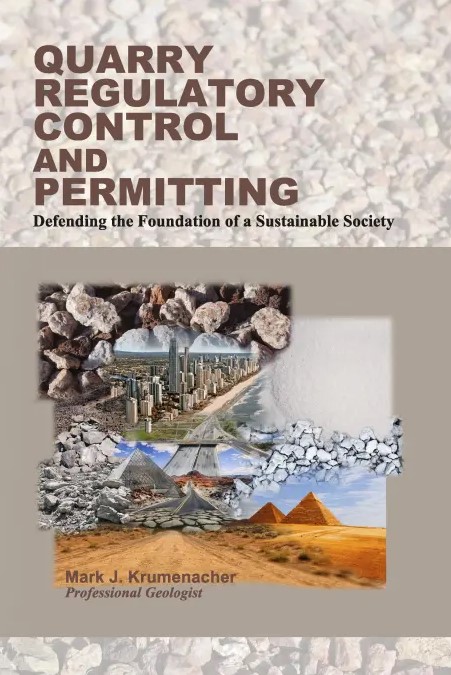Growing up my father was always showing me this rock and that rock and telling me their names, how old they were, what they were made from, etc. He was a geology teacher, so rocks were his thing, and in turn they became my thing as well. When I was lucky enough to be hired by Mellott, I thought finally my love of rocks might come in handy, but alas, I knew nothing about crushers. If, only my father had taught me about crushing equipment as well. But I digress, when I had the opportunity to interview Mark Krumenacher, P.G., author of “Regulatory Control and Permitting Defending the Foundation of a Sustainable Society”, I was thrilled. After reading his book I had a plethora of questions and was so excited to pick his brain. Our conversation was over two hours long and I felt like we were kindred spirits. We agreed on so many things, but the one thing we connected with the most was that people do not understand the importance of the aggregate industry.
Which led me to my first question. What are ways to educate the public regarding the aggregate industry? Mark’s response, “It’s not being done. We don’t spread the news to the ‘average Joe’. Nobody has any idea of what’s being done in the non-metallic world of mining. We do not teach it unless it’s in a college geology class.” Our discussion went into how many things in our daily lives require aggregates. Like, toothpaste, gum, baking soda and powder, chili powder, not to mention roadways, homes, all glassware, too many things to mention in this short blog. That’s when he said the most profound thing to me, “If it’s not grown, it must be mined.” Which I guess I knew all along, but it never really sunk in. I’m sure the “average Joe” deep down may know that, but it’s not sinking in for them either.
There is also the “Not in my backyard” mentality, that we all understand, but it is not realistic. In response to that Mark said, “We need to educate people. We need to change the three R’s (reading, writing and arithmetic) to the four R’s, adding ‘reality’ to the curriculum. Some people clearly do not understand where things come from or where waste goes.” Educating the public is key to help ease the permitting process for non-metal mining. I asked, if more people realized what the cost of all the regulation and permits cost them in the long run, do you feel that would incite change? To that Mark said, “$3 to $15 per ton will not hurt them enough. The real cost is when the permit is denied. Now the jobs that would have been brought to that area will not happen, along with much needed aggregates not being produced.”
Mark’s book “Quarry Regulatory Control and Permitting Defending the Foundation of a sustainable Society” is not something he wrote to make money; it was to educate the public and decision makers of the importance of aggregates. He wants the book to be available to as many people as possible to add reality into the mix for decision makers that issue permits, neighbors of mines, local businessmen, etc. If you need assistance with the permitting process, this book may be your answer. It can be ordered here https://quarrybook.wordpress.com/
More importantly, and consistent with Mark’s message regarding the purpose, contact him directly or through the website for an opportunity to obtain large quantities of the book at cost, which is based on actual costs to hire a professional editor, printing, and shipping – not his time to write, revise, publish or ship.

